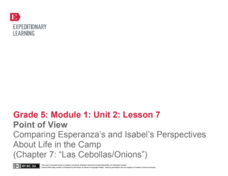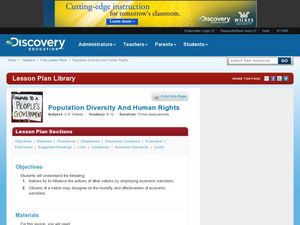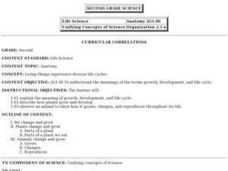Curated OER
The Crayon Box that Talked: Welcoming Indviduality
Just like a box of crayons, every child has a special way of contributing to the greater picture.
Curated OER
Introduction to Canada
Ninth graders investigate the country of Canada by examining their media in this geography lesson. They use the Internet to research Canadian newspapers and analyze a topic covered by both US and Canadian media sources. After comparing...
Museum of the American Revolution
People of the Revolution
It's nothing new—America has always been a melting pot of cultures. The resource explores the diversity of individuals living in the American colonies during the Revolutionary War. Scholars examine artifacts and primary sources to...
University of New Mexico
Educating Culturally and Linguistically Diverse Students
Three mini units make up one large unit designed to explore multiculturalism and encourage cultural identity. Each lesson sparks thoughtful discussion, critical thinking, and are equipped with activities and assignments geared to...
US Institute of Peace
Perspectives on Peace
Is peace simply the absence of war, or is there more to the story? Young social scientists define peace in the second installment of a 15-part series. Groups work together to explore cultural concepts of peace and the peacemaking process...
Teaching Tolerance
Slavery as a Form of Racialized Social Control
An engaging lesson delves into the effects of slavery on society. Young historians read text excerpts, complete handouts, and participate in group discussion to understand how slavery was a means to control society and establish a racial...
Teaching Tolerance
Mass Incarceration as a Form of Racialized Social Control
Mass incarceration: A result of a tough stance on crime or racial discrimination, you decide. Academics explore the history and reasons behind mass incarcerations in the United States and its impact on ethnic communities. The...
Teaching Tolerance
Dismantling Racial Caste
It's time to end racism. The final installment of the series encourages scholars to consider what is needed to ended the racial caste system in the U.S. Young historians complete group discussion, written prompt, and a hands-on-activity...
Maryland Department of Education
The Concept of Diversity in World Literature Lesson 7: Cultural Commentary
As part of their study of Things Fall Apart, class groups develop a multimedia presentation in response to the question, "In what ways does Achebe use literature as a means to express and comment on culture and history?"
PBS
Who Are Latinos?
What does it mean to be Latino? With an eye-opening lesson plan, pupils discover what it means to be Latino in the United States. They participate in classroom discussions, use graphic organizers, and watch a short video to help them...
Newsela
Understanding "A Long Walk to Water"
What is the secret to success? Scholars use close reading of a variety of articles to determine characteristics of people that overcame hardships to become successful. While reading, pupils annotate their copies, make claims, and...
Curated OER
Our Diverse Classroom
Celebrate the diversity in your classroom with an activity that has children explore the backgrounds and experiences of their peers. Each child is given a worksheet intended to foster a conversation about things commonly associated with...
Kenan Fellows
Determining Stream Health by the Diversity and Types of Benthic Organisms
How diverse are the benthic organisms found in local streams? Using the information learned in previous lessons on identification of macroinvertebrates and on calculating stream index values, groups determine the health of local streams....
Curated OER
That Is Not My Opinion!
Being an informed citizen requires distinguishing fact from opinion and understanding persuasion methods. Secondary learners evaluate newspaper editorials. They read opinion pieces, identify the writer's purpose and position on an issue,...
Curated OER
Bits of Braille
Intended to build an understanding of Braille in a general education classroom. They read the book Helen Keller then write their names using a braille website. Many interesting web links are included. Could be used for a general or...
EngageNY
Point of View: Comparing Esperanza's and Isabel's Perspectives About Life in the Camp (Chapter 7: "Las Cebollas/Onions")
Explore point of view and more with a Common Core-designed instructional activity. Learners experience different points of view by representing one of two characters from Esperanza Rising during a partner discussion. They must use...
Benjamin Franklin Tercentenary
Franklin’s Philadelphia: Another Point of View
The impressive story of Benjamin Franklin, including his rise from a printer’s apprentice to a statesman, color upper-level scholars’ understanding of the possibilities of life in colonial Philadelphia. But not everyone had the...
Special Olympics
A World of Difference
Kids engage in a series of activities that ask them to consider differences and similarities in characteristics, both visible and invisible. With this new understanding, the class investigates the Special Olympics program and develops...
Curated OER
Chrysanthemum
Our uniqueness should be celebrated, not teased. The story Chrysanthemum addresses having a distinct name and dealing with different perceptions. Pre- and post-reading questions are listed to help your learners understand and make...
Staten Island Zoo
The African Savanna
Are you thinking about taking your class to the local zoo? Kids of all ages love visiting exotic animals in order to learn about biodiversity, habitat, and animal adaptations. Here is a 44-page activity guide that provides educators with...
Curated OER
Population Diversity And Human Rights
Learners explore the concept of economic sanctions. For this population diversity and human rights lesson, students examine how the United States uses economic sanctions to support or prohibit international activities. Learners present...
Curated OER
Native American Perspectives
Discover the unique perspective of a Native American in the Woods Canyon Pueblo by reading stories and answering questions. Afterward, your class will consider their own ancestry and culture and compare it to the Pueblo culture.
Curated OER
Living Things Experience Diverse Life Cycles
Second graders will study and explain the meaning of growth, development, and life cycle. They describe how plants grow and develop and observe an animal to show how it grows, changes, and reproduces throughout its life.
Curated OER
Analyzing Intertidal and Deep Sea Vent Communities
Young scholars study how scientists measure diversity. In this diversity lesson students look at marine communities and look at data to calculate diversity in 3 different ways.

























